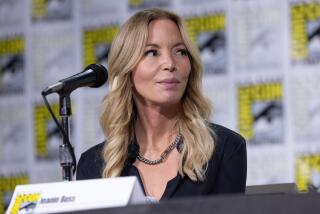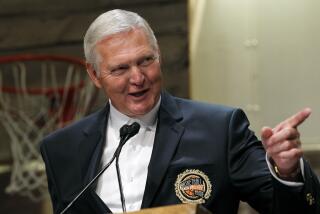Q&A: Lakers great Jerry West reveals strained relationships
- Share via
Jerry West, the Lakers’ Mr. Clutch who was an All-Star in all 14 of his NBA seasons before helping assemble teams that won six NBA titles as Lakers general manager from 1982-2000, says in his new book that his personnel job was “like putting on a Broadway play and hope you cast it perfectly.”
In “West By West: My Charmed, Tormented Life,” to be released this week, the 73-year-old Hall of Famer, newly hired as special advisor to the Golden State Warriors, reveals the dark drama that swirled around and within him during his legendary run in Los Angeles.
He writes of beatings and an absence of love being raised by his father, Howard, in West Virginia; of the Korean War death of his immensely kind brother, David; and of fighting the demons of depression and insecurity during both the lows of repeated NBA Finals losses to the Boston Celtics as a player and the highs of his last title as GM.
Has writing the book been a cathartic experience?
“Yes and no. The process of doing this was one of the most difficult things I’ve ever done. I wanted to stop writing it several times, especially the part in regard to my father, who was not here to respond. People might’ve had an idea that I’d had tough times. They didn’t know the depths — that the same things that brought me such joy also caused such pain. You always want to strive to be the best, but I did so at great expense.”
Nothing more illustrates that than the fact the death of your brother influenced the level of greatness you reached in the NBA. Do you agree?
“It was not just a bad loss for me, but our entire household. Living through the debris of that, reading his letters [from war], it did change me. It made me angry, defiant. I changed. I became deathly quiet. Trust was always a factor. In your home, you just want someone to say, ‘You’re OK.’ When that doesn’t happen, you play imaginary mental games with yourself. I wanted to feel good about something. I picked up a basketball. I was self-taught. It was no sanctuary. I just loved being by myself, having the imagination I had. It led me to a way of living to make my own dreams possible.”
A parallel example is that you reveal in the book you were hospitalized for exhaustion after finalizing the acquisition of Kobe Bryant and Shaquille O’Neal in 1996.
“It got very discouraging — there were so many obstacles along the way, it was a long, drawn-out thing — but [Lakers owner] Jerry Buss said, ‘Let’s keep going.’ It was easier then, because there weren’t a lot of people around [in the front office]. It became a quest. We felt it was important to rejuvenate our franchise.”
Kobe Bryant worked out for you at Inglewood High that year, with the great defender Michael Cooper guarding him. At the end, you said, “I’ve seen enough.” What did you see?
“Drafting high school players that high back then was not in vogue, but he was such an incredibly talented kid who could not just run fast and jump high . . . it was his joy for the game. He’d die on that court. It was so easy to see that. I felt he’d help us on our quest to get Shaquille, and be a tremendous piece — the prince in waiting. I remember telling Jerry the night of the draft, ‘We might’ve got the No. 1 player in the draft [at No. 13].’ He is a player for the decades.”
(During this interview, West said his team-building strategy was based on “looking for good fits . . . it’s about talent, but [also] how that talent fits together, judging how the talent will mature.” He said he retains “a special spot in my heart” for former coach Pat Riley, who led the team to four titles in the Magic Johnson-Kareem Abdul-Jabbar era.)
You write that coach Phil Jackson “absolutely had no respect” for you, and that as your “incredible feeling for the Lakers began to wane” in the late 1990s, in hindsight, you “would have left shortly after [Jackson] arrived,” in 1999. Why was that relationship so bad?
“I told Jerry Buss to hire him. The only thing I cared about was winning, but you want a relationship with your coach. There was no relationship. You felt, ‘This is not the way we’ve operated, and we’ve won without him.’ You can’t win without great players. As good as Phil is, he might improve a team with bad players, but he wasn’t going to win. I felt underappreciated by leadership, and leadership is ownership. As we left the Forum to Staples Center, I’d say, ‘What am I doing here? What am I doing to myself?’ Destructive feelings, a different drama every day. Leaving was the biggest relief of my life. They had just won a championship, and would win two more. It was time for me to go.”
How are you and Jerry Buss now?
“We have lunch every once in a while, it’s a different relationship. I enjoy it. He has his family involved with running the team now, and that’s something I’d even suggested to him. Everyone just has to be committed to being on the same page. Don’t step out and make your own decision. Make it in the best interest of the Lakers. It’s never one person. Accept the blame. And ‘no comment’ is not an acceptable answer.”
You’ve now joined the rival Golden State Warriors as an advisor with a three-year deal with owners Peter Guber and Joe Lacob. Can you merely be an advisor?
“I knew you’d ask this. They want my opinion. I won’t be the final decision, even though I may want mine to be. This puzzle needs pieces. How can we do that without disrupting the entire board? We’ll compete against one of the best franchises [the Lakers] and it’ll be something when we beat them and you’re no longer surprised. I feel in a vibrant city we can do something positive. You can’t do it by being passive. We have to be aggressive. One playoff appearance in 17 years is not acceptable.”
West will have a public conversation with Guber, a Hollywood producer, at 8 p.m. Tuesday at Track 16 at Bergamot Station in Santa Monica.
twitter.com/latimespugmire
More to Read
Go beyond the scoreboard
Get the latest on L.A.'s teams in the daily Sports Report newsletter.
You may occasionally receive promotional content from the Los Angeles Times.











